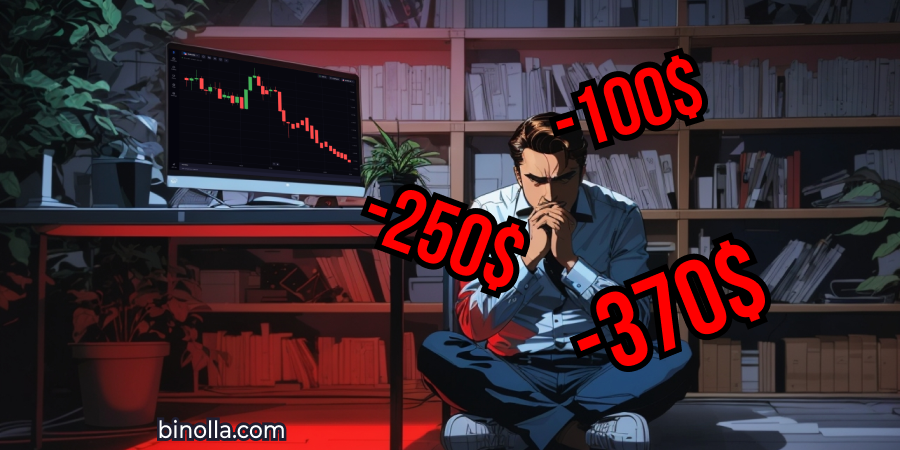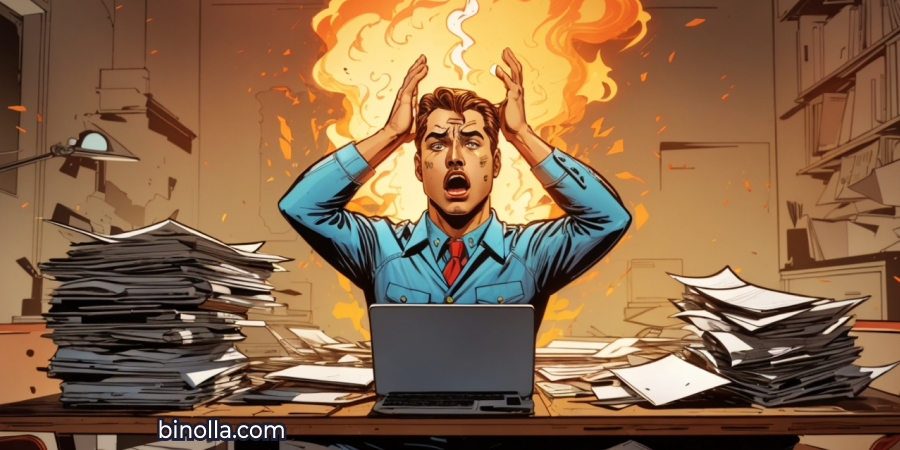Techniques for Traders: Staying Present and Focused

Trading is not only about analyzing markets and making decisions. Whether you buy digital options or Forex CFDs, your trading output will depend on many factors, including your psychological state. Even if you have a reliable strategy, you should stay present and focused in order to succeed. By reading this article, you will learn more about the psychological phenomena in trading. Moreover, some recommendations on how to stay present and focused will be given. To start trading now and apply your skills, open an account at Binolla!
Contents
- 1 What is the Focus in Trading?
- 2 Why Do We Lose Focus?
- 3 Sleep Deprivation in Trading: How a Lack of Sleep May Affect Your Trading Output
- 4 Stress Environment in Trading: How It Shifts Your Focus
- 5 Distraction in Trading: the Negative Impact of Distraction on Trading Performance
- 6 Use various trading techniques with Binolla!
- 7 Fatigue and Exhaustion: the Worst Enemies of Traders
- 8 Hunger and Meals: When Your Stomach Dictate Your Trading Activities
- 9 Poor Time Management: Planning Time in Trading is Crucial
- 10 Multitasking in Trading: To Be or Not to Be?
- 11 Mastering Techniques from Professional Traders and Investors
- 12 FAQ
What is the Focus in Trading?
Focus is the ability to set the mind on solving tasks or towards a particular activity without distraction. A complete focus is the key to being successful in whatever activity you participate in. In relation to trading, staying focused allows market participants to avoid mistakes and mitigate risks of improper analysis.
Getting distracted means losing focus and making decisions that may lead to negative output. Any interruption in the process of analyzing or making decisions may affect your trading results. Whether you see a pop-up notification on the screen or you are distracted by someone around you, your trading performance will be affected.
Keep in mind that staying focused for day traders may be different from staying focused for position traders. In the first case, you need to be able to concentrate for a couple of hours a day. In the second case, you don’t need to stay focused throughout the trading hours as your task is to analyze events with long-term impact and you can think about them for longer.
Why Do We Lose Focus?
Several factors may affect our focus in trading. Apart from some evident ones, like distraction, there are other aspects that should be considered. We are not going to look at some disorders that may influence the way you can focus on something. However, we are going to consider some things that you can control and improve in order to be better focused on your trading.
Sleep Deprivation in Trading: How a Lack of Sleep May Affect Your Trading Output

One of the factors causing distraction is sleep deprivation. Insufficient sleep can lead to reduced concentration and slower thought processes. When it comes to trading, this can result in more mistakes that a trader makes during their trading sessions.
Sleep deprivation negatively affects cognitive function and decision-making abilities. Moreover, it can break emotional stability, which is vital for successful digital options and Forex trading. According to the latest research, lack of sleep results in decreased focus and attention. It also negatively affects problem-solving skills.
How to Tackle Sleep Deprivation
First, you can enhance your cognitive abilities through quality sleep. During sleep, the brain processes information received when you are awake. This enhances memory, learning, and creativity. When it comes to digital options and Forex trading, quality sleep helps maintain mind sharpness and even adapt to market strategies more effectively.
Stresses and emotions surround and accompany Forex and digital options traders all the time. The unpredictable character of price fluctuations may lead to mental volatility. Lack of sleep makes the whole thing even worse and may result in emotions taking control over your trading routines. If this happens, the results may become negative even if you have a relatively reliable strategy.
Establishing healthy sleep habits may help you tackle this problem:
- Set a sleeping schedule. While it may seem evident, sometimes traders can’t follow this schedule, especially when they are trading during night sessions. Therefore, you should set an alert telling you when to open your last trade. Once this time arrives, you should close the trading platform and go to sleep without giving you any chances of placing another trade. By doing this, you will let your brain and body rest to be fresh during your next trading sessions;
- Going to bed means sleeping. Avoid reading the news before you go to sleep. Also, you should not think about your previous day’s trading results. What’s done is done. Let your mind “reboot” to be ready for the next trading battles;
- Stop thinking about the active trades. Another problem that may lead to sleep deprivation is that you think too much about the trades that you have left overnight. Whether you are trading digital options or Forex CFDs, you should forget about your positions to give your brain some rest. Remember that once you have bought a digital options contract, you can’t influence the situation. You should let it go. When it comes to Forex CFDs, you should use stop losses and take profits to let it go as well.
Stress Environment in Trading: How It Shifts Your Focus

Stress is what accompanies every trader throughout their trading career. If you want to become successful in this niche, you should know how to cope with stress and mitigate its impact on your trading results. While you can’t completely eliminate it, there are some techniques that may help you reduce its influence on your trading sessions.
How to Tackle Stress and Improve Your Trading Results
The main source of stress in trading derives from the uncertainty that traders deal with every day. With some recommendations below, you will be able to manage the level of stress and minimize its impact on your trading output:
- Do exercises. Make sure that you are in good physical condition when trading. You can do exercises before your trading session begins. Spend some time on stretching, and cardio to stay in shape and you will see how the impact of stress on your trading decisions will decrease;
- Wolk/life balance. Maintaining a healthy work/life balance will help you stay in shape and, thus, improve your trading results over time. It is recommended to set a trading schedule and not break these boundaries whatever happens. If you are trading during the American session, for instance, avoid opening positions after it. While trading is very attractive and captivating, you should set clear boundaries and maintain them;
- Do not try to control what you can’t control. There are things that you can control in trading and other things that are out of your reach. For instance, you don’t know in advance where the next big trend will appear (you can only try to forecast it), but you can manage your position in order to avoid bigger losses or, on the contrary, improve your performance by holding positions for longer in Forex trading. When it comes to digital options, such contracts allow you to control your budget in trading by default as such contracts are limited in time and you know in advance how much you will gain or lose during your next trade;
- Make pauses in trading. Whatever activity you carry out, making pauses is crucial for success. As for trading, your mind and body may need relaxation even during the session. For instance, after closing a losing or successful trade, you can take time and shift focus to something else or even defocus, letting your brain and body use this opportunity to relax. Once you get back to work, you will see that your mind is ready for the next trade better than if you were trading one by one.
Distraction in Trading: the Negative Impact of Distraction on Trading Performance

Some days you may find it extremely difficult to concentrate when you start trading. This is due to distraction, which prevents your mind from focusing on these activities. Distraction may lead to losses simply because you are unable to concentrate on the market analysis. Poor decisions may happen even if you have a good strategy as you may simply miss some key elements or events that will lead to unfavorable results. What to do?
How to Tackle Distraction and Improve Your Trading Results
There are many ways to deal with distraction in trading. Some of the recommendations may be useful to you:
- First, when trading, try not to think about anything else except trading. This doesn’t mean that you are going to sit in front of your PC, laptop, or with your mobile device in your hands for hours monitoring markets. The idea is to concentrate for a while to work with your strategy. It is not a good idea to watch television or browse videos/social media along with making trading decisions;
- Tell your homies about your activities. It is crucial to notify your relatives or roommates about the importance of your trading. It is better to explain to them that distracting you is not a good idea and you need to focus for a while. Otherwise, you risk losing focus and lose money consequently. One of the solutions is to work in an enclosed space;
- Watch your workspace. Keeping it clean will help you focus on your trading activities. Do not leave things on your table that may distract you. Also, you can add music to your trading. However, beware of modern melodies that may distract you. The best choice for many traders is classical music;
- Avoid dealing with stressful activities during trading. Leave them for later. Reading emails or messages that may stress you while you are trading is not a good idea. If it can wait, then it should wait. Emotions that may be provoked by such messages may take control over your trading decisions and impact the output.
Fatigue and Exhaustion: the Worst Enemies of Traders

Trading makes your mind work at its extremes. This, in turn, leads to fatigue and exhaustion after each trading session. Moreover, fatigue comes even during the trading session at some point. As you may guess, once you feel exhausted, this will definitely impact your trading outcomes as it will negatively affect your brain activity.
How to Tackle Fatigue and Exhaustion to Focus on Trading
There are plenty of ways for traders to deal with fatigue and exhaustion. Most of them are already described in this article. For instance, by doing exercises regularly, you will be able to spend more time in front of your PC or laptop placing trades as your mind and body will be in shape.
Moreover, traders can diversify their trading activities. For instance, instead of constantly monitoring the price of a single asset, a trader can read financial news, check other strategies, consider other financial instruments, etc. The idea here is that overfocusing may be as harmful as defocusing. Try to find the balance.
Hunger and Meals: When Your Stomach Dictate Your Trading Activities
You will be surprised, but hunger may affect your trading and focus level as well. According to the latest research, there is a direct connection between the decisions we make in a day and the meals we take for breakfast. A low carbohydrate diet reduces the amino acid levels, which, in turn, increases the secretion of dopamine. This hormone enables traders to think more accurately and make informed decisions. Therefore, eating breakfast with a low concentration of carbohydrates will stimulate your brain activity in the way that is necessary to make better decisions in trading.
Even if we leave aside all this scientific research, being hungry during trading means losing focus. You can’t concentrate when your stomach suffers from hunger. Therefore, if you feel that you need to take a meal then do it as you will nourish your body and will be able to focus on your trading activities instead of on your hunger.
The only recommendation here is to avoid eating “unhealthy” food as this may have a contrary effect. Instead of focusing on trading, your body will concentrate on food processing and discomfort. Moreover, you should also avoid overeating as more energy will be spent on food processing.
Poor Time Management: Planning Time in Trading is Crucial

Poor time management in trading can be as harmful as poor time management in business. If you can’t plan your time properly, then your trading activities will become chaotic. This, in turn, will lead to chaotic trading decisions. With poor time management, losing focus is a matter of time.
Before delving into proper time management, let’s begin with its basics. Time management in trading is the ability to allocate time to various operations. For instance, you should devote some time to market analysis, some time to making decisions, etc. If you don’t do this, you will simply lose focus and risk making bad decisions.
To avoid poor time management, you need to consider each and every trading session and see what you spend time on. It was already mentioned that social media may distract your attention.
However, even if you spend much time on them in non-trading hours, this may also be harmful as your brain will process a lot of information and get tired faster. Therefore, limiting your browsing on social media even when you are free will be a good idea. It will also liberate some hours that you can spend on other more useful activities.
A lack of priorities may also contribute to losing focus. Before even engaging in trading activities, you should think about your goals and pinpoint priorities. By doing this, you will have a clear understanding of what you want to achieve and how to do it.
Multitasking in Trading: To Be or Not to Be?
Julius Caesar was famous for his military campaign in Gaul and his political career. One of his traits discussed over ages was multitasking. The famous Roman military and political leader was known for his ability to solve several problems at a time.
We can’t say whether his success was paved by this trait or, on the contrary, multitasking was one of the factors that slowed him down, but when it comes to trading, it may negatively impact the outcomes.
We have already discussed that you should allocate your trading time to various activities to avoid extreme exhaustion and burnout. However, the trick here is that you should not try to do it simultaneously. Therefore, when planning various activities, you should think about how much time you are ready to devote to each.
Multitasking may slow down the decision-making process. Therefore, intraday traders may lose opportunities when trading digital options or Forex CFDs. Keep in mind that the market waits for no one.
Mastering Techniques from Professional Traders and Investors

There are plenty of techniques that you can use to focus on trading. Below you can find some methods that famous traders apply.
Steve Neeson
Steve Neeson, aka “father of Japanese candlesticks”, applies the “deep work” technique to focus on chart analysis. He allocates special blocks of time to analyze charts when he is completely disconnected from the outside world.
This allows this famous trader to eliminate all distractions such as phone, social media, and email. Moreover, Steve Neeson digs deep into the details and looks for patterns that are not obvious at first glance.
The benefits of this approach include:
- Allows you to focus on complex tasks without distractions.
- Improves the ability to see details that may be missed by superficial analysis.
Alexander Elder
Alexander Elder, a successful trader and author of How to Play and Win at the Stock Exchange, offers the “reverse pyramid” technique for risk control and concentration.
To apply this method, Alexander Elder determines the level of risk for each trade and distributes it according to the inverse pyramid principle. Then he makes a small investment at first, then increases it if the predictions are confirmed. By strictly following the rules, he manages to stay within the acceptable range of risks.
The benefits of this approach include:
- Helps control risk and avoid large losses.
- Increases concentration at each stage of the transaction and allows you to make informed decisions.
Warren Buffet
Warren Buffett, one of the greatest investors ever, uses a simple but effective method to focus on the main objectives. He suggests writing a list of 25 goals he wants to accomplish highlighting the five most important ones. Then he focuses only on these five goals and ignores the rest.
The main advantage is that this method helps you get rid of absent-mindedness and focus on the most important goals.
Ray Dalio
American financial guru, investor, and founder of Bridgewater Associates uses meditation practices to stay focused. They allow him to clear his mind and improve concentration. By meditating 20 minutes a day, and allowing thoughts to go through your mind without analysis, you will be able to relax and prepare yourself for the next trading session.
The benefits of this method include increased concentration and focus. Moreover, everyday relaxation decreases stresses, which accompany trading routines.
Linda Raschke
The famous trader from the United States ignored other opinions when making trading decisions. According to Linda Raschke, she does it because she wants to focus on her own analysis and decision-making instead of spreading her attention across others’ views. Also, she has a strict daily schedule that starts at 6.00 am. Once all the routines are done, she is in bed at 11.00 pm. This schedule allows the famous trader to maintain the necessary level of discipline.
The benefit of her approach is evident. When avoiding listening to others, she is more focused on her own market predictions, while scheduling makes her trading more systemized.
Paul Tudor Jones
The famous billionaire and hedge-fund founder focuses on risk management above other aspects. This approach allows him to avoid stress. By knowing in advance how much you can earn or lose in a trade, you can be more calm and, therefore, you will be able to better plan your trading sessions and focus on analysis.
Ed Seykota
Similar to Paul Tudor Jones, Ed Seykota uses various tactics to control emotions. In particular, the most popular ones are deep breathing and visualization. Breathing techniques are different, but you can use the basic ones. For instance, you can breathe in for 5 seconds, and then breathe out for 5 seconds.
Ed Seykota recommends visualization to maintain focus. Create mental images that will help you stay present and clear-minded.
FAQ

What Are the Reasons Contributing to Losing Focus in Trading?
Several reasons may lead to losing focus in trading. These can include stress, fatigue, lack of priorities, hunger, and even sleep deprivation. Traders with a lack of focus can make emotional decisions that will detract them from disciplined trading.
Can Emotions Impact Focus in Trading?
Yes, they can. Any emotional turbulence during the trading process may lead to poor decision-making due to a lack of focus. Therefore, traders should learn how to maintain emotional control and try to avoid factors causing higher emotional volatility.
How to Maintain Focus in Trading?
There are many techniques and strategies that help traders maintain their focus. They may include developing a trading plan, avoiding distraction factors, practicing setting the right mindset, etc.
Can Overtrading Contribute to Losing Focus?
Yes, sure. Overtrading leads to fatigue and exhaustion, which, in turn, may be one of the reasons a trader loses focus.
Why Planning in Advance is Essential for Maintaining Focus?
When you elaborate a clear trading plan, you have a structure and direction that will allow you to focus on your goals instead of spreading your attention over various distracting factors.







